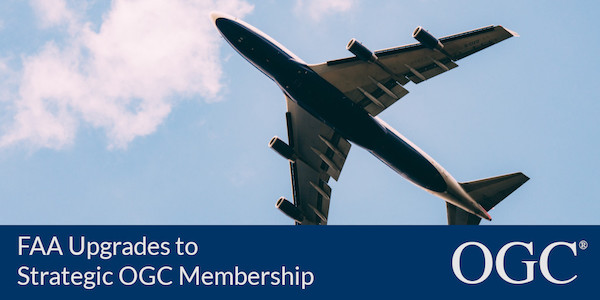Subscribe to our Press Release
Subscribe here to receive future Press Releases by email: Subscribe
info [at] ogc.org
FAA upgrades to OGC’s highest level of membership to help drive standards and shape development priorities relevant to aviation
The Open Geospatial Consortium (OGC) is pleased to announce that the United States Federal Aviation Administration (FAA) has raised its membership level from Technical to Strategic – OGC’s highest level of membership.
FAA joins the likes of the US Department of Homeland Security (DHS), US Geological Survey (USGS), US National Aeronautics and Space Administration (NASA), the US National Geospatial-Intelligence Agency (NGA), European Space Agency (ESA), GeoConnections/Natural Resources Canada, and Ordnance Survey UK to actively shape the future of location-based standards and improve their utility for decision-makers across the globe.
As a Strategic Member, FAA will participate in OGC’s Planning Committee to provide leadership through the exploration of market and technology trends to ensure that OGC’s activities remain effective and agile in a changing technology environment. FAA will also participate in final approval decisions for all OGC standards and nominations to the Board of Directors. Further, FAA will work with other Strategic Members as part of an OGC Strategic Member Advisory Committee to help identify and advance high priority areas of interoperability concern.
OGC CEO Nadine Alameh commented “It’s great to see the FAA joining other OGC Strategic Members to lead the way in making location information Findable, Accessible, Interoperable, and Reusable (FAIR). As the amount of aeronautical, weather, and flight information increases, so does the need for data standards that ensure its syntactic and semantic interoperability.
“OGC is delighted that the FAA appreciates the value of standards, and is eager to use all that OGC membership has to offer – including access to our agile Innovation Program and community of experts. OGC is excited to work with the FAA to advance standards in support of the global System Wide Information Management (SWIM) modernization movement, where safety in decision-making is of the utmost concern.”
The FAA has long been a supporter of international collaboration. As such, the FAA has been a close partner of OGC via earlier leadership in OGC’s Aviation Domain Working Group and its sponsorship (via requirements, data, and funding) of eleven Innovation Program initiatives since 2008.
By utilizing the OGC Innovation Program, the FAA (alongside EUROCONTROL) have helped advance and promote interoperability concepts around all three XMs (AIXM, WXXM, FIXM) and the underlying web service architecture components for access, discovery, filtering, processing, and visualization. The outcomes of the Aviation threads of OGC’s Innovation initiatives have been successfully incorporated into SWIM Segment 2 requirements as well as ICAO SWIM guidelines.
About FAA
The continuing FAA mission is to provide the safest, most efficient aerospace system in the world. The agency strives to reach the next level of safety and efficiency and to demonstrate global leadership in how it can safely integrate new users and technologies into its aviation system. Over the past 50 years, under the FAA, aviation has become central to the way Americans live and do business, linking people from coast to coast and connecting America to the world. To ensure aviation’s future viability, FAA is now working with its federal and industry partners to develop a flexible aerospace system that fully responds to the changing needs of businesses and customers in the 21st century. The strength of the NextGen system depends on lower costs, improved service, greater capacity, and smarter security measures. That is why FAA has defined a vision of the future that integrates achievements in safety, security, efficiency, and environmental compatibility.
About OGC
The Open Geospatial Consortium (OGC) is an international consortium of more than 500 businesses, government agencies, research organizations, and universities driven to make geospatial (location) information and services FAIR – Findable, Accessible, Interoperable, and Reusable.
OGC’s member-driven consensus process creates royalty free, publicly available geospatial standards. Existing at the cutting edge, OGC actively analyzes and anticipates emerging tech trends, and runs an agile, collaborative Research and Development (R&D) lab that builds and tests innovative prototype solutions to members’ use cases.
OGC members together form a global forum of experts and communities that use location to connect people with technology and improve decision-making at all levels. OGC is committed to creating a sustainable future for us, our children, and future generations.
Visit ogc.org for more info on our work.






